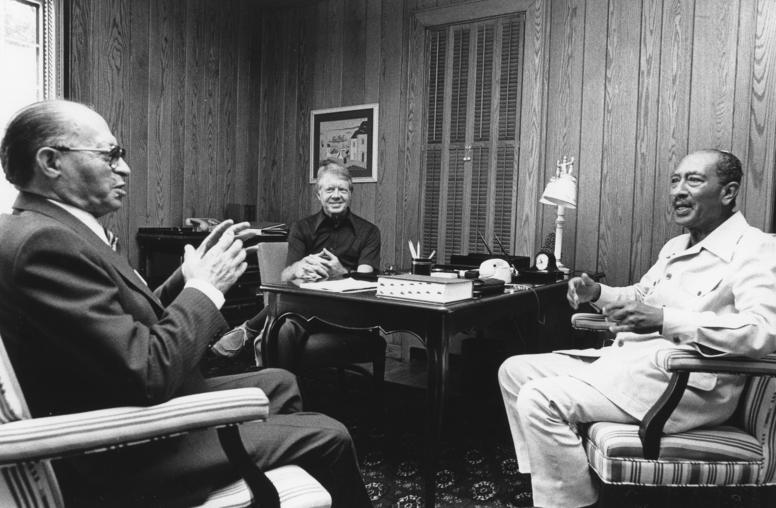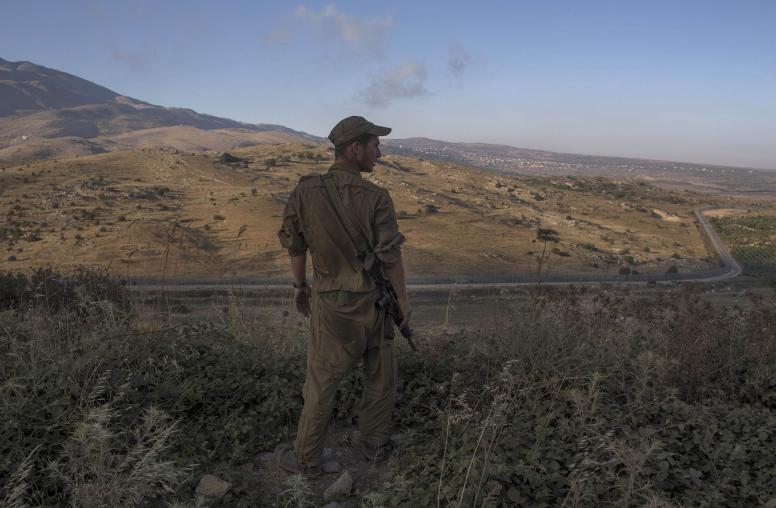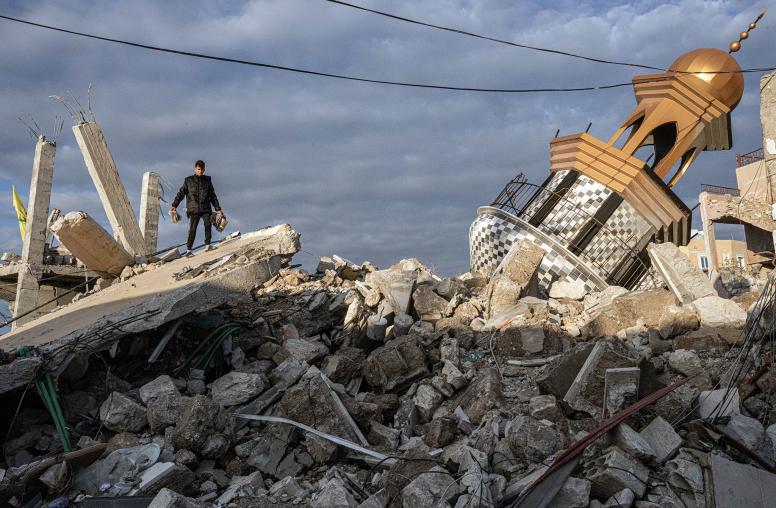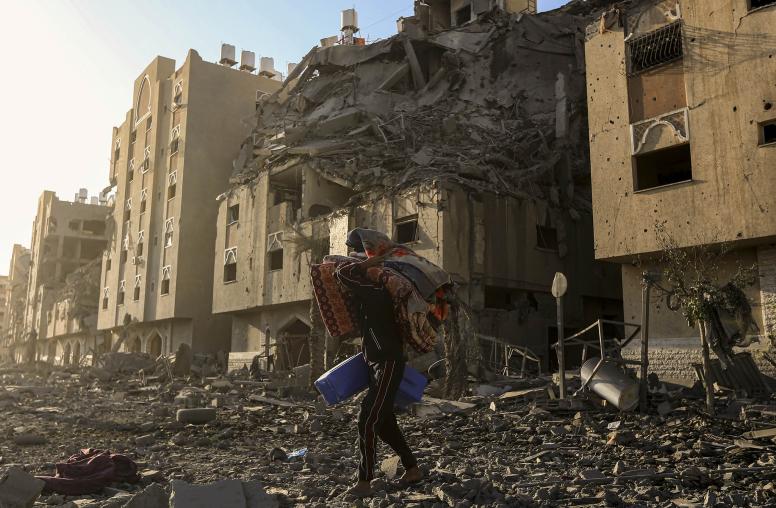Research & Analysis
U.S. Institute of Peace’s articles, reports, tools and other features provide policy analysis, research findings, and practitioner guides. These publications examine critical conflict issues at the center of the Institute’s work to prevent and resolve violent conflict.
The views expressed in these publications are those of the author(s).

Netanyahu Comes to U.S. Amid Potential Inflection Point in the Middle East
On Tuesday, Israeli Prime Minister Benjamin Netanyahu becomes the first foreign leader to meet with President Donald Trump since his return to the White House. The visit comes as a fragile but holding cease-fire in Gaza approaches the midway point of its initial six-week phase, and as phase two of the agreement’s prescribed negotiations begin, with critical questions surrounding Gaza’s transitional security and governance to be decided. It also comes against a backdrop of a recently extended cease-fire deal between Israel and Hezbollah, expressed interest by both Trump and Netanyahu in advancing Israeli-Saudi normalization, and international concern over Iran’s nuclear threshold, despite the setbacks dealt to the “Axis of Resistance.”

Jimmy Carter and the Unfinished Business of the Camp David Accords
President Jimmy Carter’s passing has prompted many reflections on his life and legacy. Few of Carter’s achievements have had as lasting an impact as the 1978 Camp David Accords. Between 1948 and 1978, Egypt and Israel had known nothing but waves of violence and stalemate. After Camp David, the Israeli-Egyptian relationship that was once a key threat to Middle East security became a resilient cornerstone of regional stability.

What Assad’s Fall Means for Israel and Its Regional Relations
From an Israeli strategic calculus, the unexpected and precipitous fall of Assad at the hands of Hayat Tahrir al-Sham (HTS) is a simultaneous cause for cautious optimism and concern. Assad’s fall removes the final keystone of Iran’s arc of proxy and allied resistance through which it was able to engage Israel across its borders. With Hezbollah decapitated and depleted in Lebanon, and Iran’s resupply land route through Syria gone, Israel has removed a significant threat to its security.

Can the Fragile Israel-Hezbollah Cease-fire Hold?
On November 26, Israel and Lebanon agreed to a cease-fire to be implemented in phases over 60 days. If it holds, the deal will end over a year of the heaviest fighting in decades between the two sides. Formally a deal between Israel and Lebanon, the agreement is effectively between the former and Hezbollah. The next two months will serve as a crucial test for the possibility of a sustained truce and a more durable and comprehensive resolution of disputed border areas between the two countries.

A Year After October 7, the Middle East Crisis Has No End in Sight
The grim anniversary of Hamas’ October 7 attacks on Israel and the ensuing war brought little respite for memorialization and healing from the enormity of loss with which Israeli and Palestinian societies have been grappling. More than 100 of the over 250 Israeli and foreign hostages abducted that day into Gaza are estimated to remain in captivity, with only 64 presumed still alive; upward of 42,000 Gazans have been killed in the ongoing war, most of the enclave’s population has been repeatedly displaced, and damage and humanitarian devastation is widespread. A multi-front war that has simmered since that day is now poised to boil over with catastrophic potential for the region.

Hassan Nasrallah is dead. What happens next in the Middle East?
Two weeks ago, Israel announced that halting Hezbollah attacks had become an official goal of its post-October 7 war effort. Since then, Israel conducted a sophisticated clandestine attack on Hezbollah’s communications infrastructure and struck numerous Hezbollah targets in southern Lebanon and the suburbs of Beirut, killing many of Hezbollah’s senior leaders. Then, on Friday, an Israeli airstrike assassinated Hezbollah’s leader, Hassan Nasrallah, who led the group for over 30 years.

Whither Cease-fire Talks After Hamas Kills 6 Israeli Hostages?
Israeli soldiers’ discovery of six of their country’s hostages shot dead in a tunnel underneath Rafah, Gaza has placed the question of a cease-fire’s prospects in stark relief. Coming as the U.S. had already stepped up efforts to push for an Israel-Hamas agreement, the grim fate of the hostages can simultaneously be viewed as providing a catalyst for the urgent conclusion of a deal, or as a harbinger of diplomatic derailment for a process the U.S., Egypt and Qatar had been in the throes of pushing to resolution.

Israel-Hezbollah Contained Escalation Halts Concern Over Broader Mideast War
For weeks, concerns over the risk of miscalculation or even intentional escalation between Israel and Hezbollah have dominated attention. Ramped up cross-border attacks between the two sides on Sunday, August 25 have left each side simultaneously claiming success “for now,” suggesting a much-feared larger conflagration may have been averted in the near term. However, implications for longer-term risk and mutual deterrence, Iran’s calculations for escalation, and linkage to the still-elusive Gaza cease-fire remain uncertain.

What the Houthi-Israel Exchange Might Mean for Escalation in the Middle East
The Middle East saw yet another escalatory episode over the weekend, as Israel and Yemen’s Houthis exchanged fire. On July 19, the Iran-backed Houthis launched an unprecedented drone attack on Israel, which hit an apartment building in downtown Tel Aviv, killing one and injuring at least 10 others. It was the first time that the Houthis killed or even harmed an Israeli, despite launching dozens of missile attacks on Israel since October 7. The next day, Israel struck back with an airstrike on the strategic port of Hodeida, marking the first time it attacked Yemen. The Israeli attack killed six, injured dozens more and left ablaze key oil facilities in the area.

Gaza at the G7: The Daunting Divide between Rhetoric and Reality
The ongoing war in Gaza was only one of several items on the agenda for last week’s summit of leading Western economies, known as the Group of 7 (G7). But, given the global attention on Gaza and coming on the heels of the Biden administration’s most recent push to achieve a cease-fire — including sponsorship of a U.N. Security Council resolution toward that end — questions around the prospects for a negotiated pause in fighting and hostage agreement dominated the discussions.